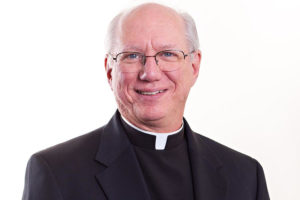Unlike a civil divorce, through which a marriage that existed is declared ended, the Catholic Church, when it grants an annulment, essentially states that a sacramental marriage never truly began, and as such is null.
According to Father Seitz, the pope’s changes to the annulment process will make the process more available and faster for certain parishioners. He noted that the archdiocese typically processes an annulment request in a reasonable timeframe, issuing a final decision within eight to 10 months.
“Some other dioceses aren’t as fortunate,” he said, noting that there are places abroad “where people talk about the process taking 10 years.”
Before the pope’s revisions take effect Dec. 8 – the same start date as the Jubilee of Mercy – a Catholic who has emigrated to the Baltimore archdiocese after being married abroad, and whose spouse still lives abroad, may have to seek the annulment in that location.
“What if the tribunal where you were married is one of those that takes 10 years?” Father Seitz said. “You’re up the creek; you literally have no alternative.”
Such situations, he continued, can have dire effects on those involved.
“From what folks have told us, they really do feel like an outcast or misfit,” he said. “So as a result they go to another church where they’re going to feel welcomed and cared for.”
The pope’s reforms, he said, would allow that person to seek an annulment in Baltimore.
One of the more talked-about changes is the removal of the automatic appeal. Previously, Baltimore had, under canon law, forwarded its affirmative “first instance” decisions – in which annulments were declared – to the Diocese of Arlington, Va., for a second look. Sometimes, the decisions were overturned.
“We probably got between 15 and 20 negative decisions (per year) from Arlington,” Father Seitz said.
A party to the decision could also request that the Roman Rota, the church’s highest appellate tribunal, hear the appeal, and that could further lengthen the process.
As of Dec. 8, the archdiocese will not be required to submit its affirmative decisions for an appeal unless requested by a party to the case.
Pope Francis has also called for the costs to be minimized, though he didn’t explicitly say that the annulment process had to be free. The archdiocese currently charges $550. According to Father Seitz, that revenue is “not holding up the office” of the tribunal, which is supported by the archdiocese.
He said that he was not sure if the pope’s reforms would impel more local Catholics to seek the services of the tribunal, which currently handles approximately 180 first-instance cases per year.
“My hope is that people in need of the ministry of the tribunal will see in this gift of the Holy Father an opportunity to use this process and find some peace and healing in their lives,” he said.
Kay LaHatte, coordinator of Remarried in Love, a ministry for Catholics who are remarried or planning to get remarried, lauded the pope’s revisions.
“I think they’re wonderful,” she said. “The fact that a case has to only go to one tribunal – I think that’s great.”
LaHatte added that the change especially made sense in cases involving abuse and other matters that often indicate, she said, a clearly invalid marriage.
“It’s almost a done deal,” she said. “Why go through it all again?”
Sister of St. Joseph Judith Cianfrogna, pastoral associate of Sacred Heart in Glyndon, also praised the removal of the automatic appeal.
“That will be a blessing for people who are waiting,” she said. “I am just so glad we’ll be able to reach out and help people, especially if they will get to receive the Eucharist sooner.”
“All we’re talking about now is evangelization and bringing people back to the church,” LaHatte echoed. “There are so many remarried couple in the pews Sunday morning; they’re there in faith, but they’re not receiving Communion. I think this is a wonderful way to bring people back to the church.”
“I think the Holy Father gave the church a great gift and a great challenge,” Father Seitz concluded. “The gift is making tribunals more accessible. … The challenge is for the ministers of justice to care for the folks in a way that enables them to experience the mercy of Jesus in this Year of Mercy.”

